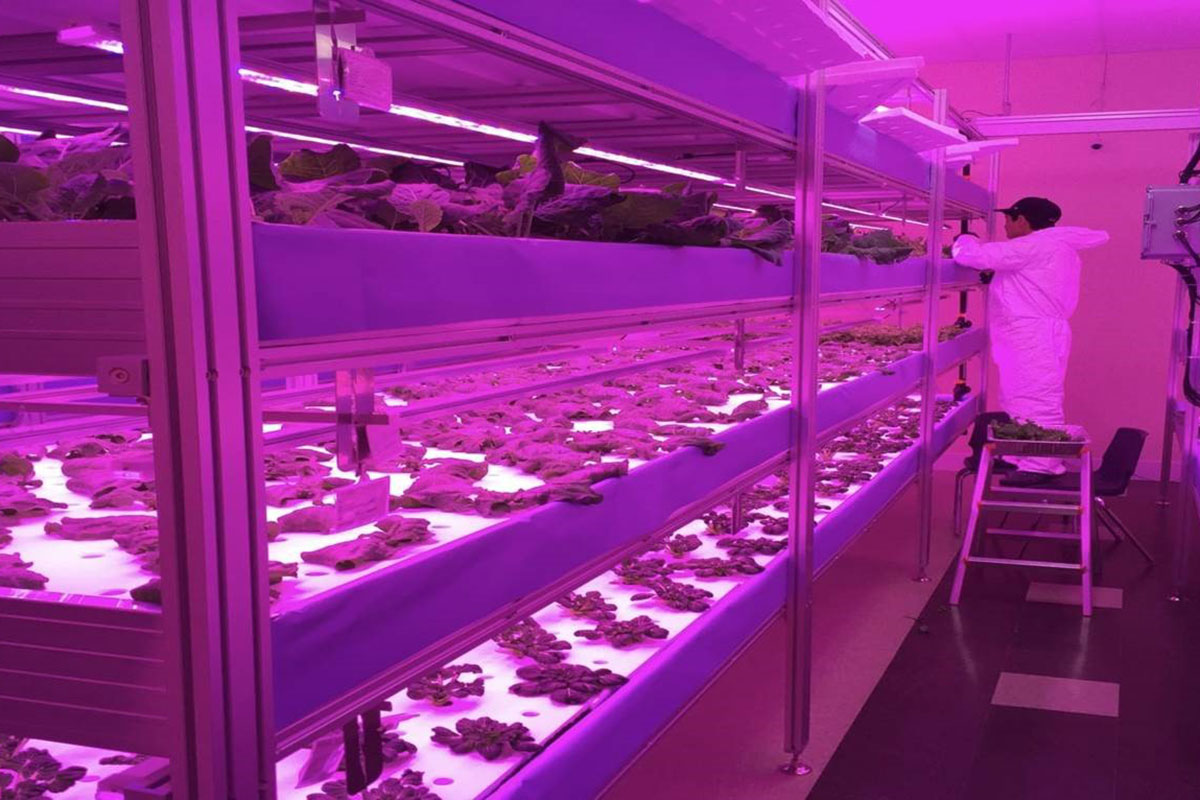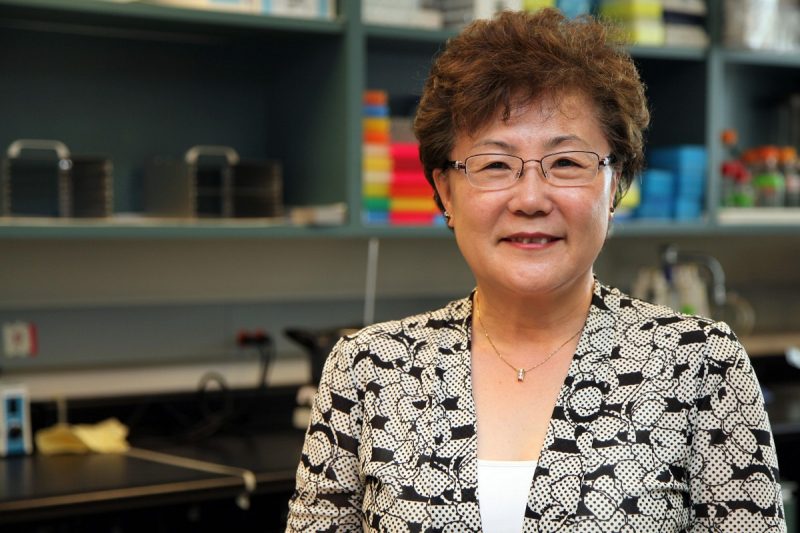
Opaskwayak First Nation (OCN) smart vertical farm. // Photo provided by OCN
Smart vertical farming to expand in Northern Manitoba
UM and Opaskwayak Cree Nation collaborate on new project
UM professor Miyoung Suh will work with Opaskwayak Cree Nation (OCN) on developing a smart vertical farming initiative for the community that will benefit many Manitobans. This is part of The Implementing Smart Cities Interventions to Build Healthy Cities (SMART) Training Platform, for the City of Guelph, City of Montreal and Opaskwayak Cree Nation located in the town of The Pas, co-led by Suh.
The announcement came today as part of the federal government’s new initiative to create a training platform that addresses our shortcomings in understanding how to make cities healthier, with better and more secure food resources, for instance. The $4.95 million in funding over the next six years will support at three leading universities: the University of Manitoba, University of Guelph (Dr. David Ma), and McGill University (Dr. Laurette Dube), and seven additional institutions.
“We know that access to healthy food and a balanced diet is essential for good physical and mental health. The research supported through this funding will help city planners find the right tools and implement the best policies to give people living in urban areas reliable and secure access to food that is healthy and affordable, improving health outcomes in Canada and around the globe,” says The Honourable Patty Hajdu, Minister of Health.
As part of her project will collaborate with OCN on developing real-world solutions to food and nutrition security in the community. Her co-applicant on this project is Glen Ross, executive director of Opaskwayak Cree Nation Health Authority. Suh is a food and human nutritional sciences professor at the Faculty of Agricultural and Food Sciences, and principal investigator of the Division of Neurodegenerative Disorders and Canadian Centre for Agri-Food Research in Health and Medicine (CCARM) at the St. Boniface  Hospital Albrechtsen Research Centre.
Hospital Albrechtsen Research Centre.
“Food is a basic entry point for building healthy communities,” says Suh. “The availability of fresh produce up north is limited, but smart technology involving local food production could be a simple solution in transforming those communities. Funding from the Healthy Cities Research Initiative will enable us to identify and tackle problems around the accessibility of healthy food systems and also train future leaders with the expertise to support healthy communities and cities.“
Suh’s research team includes other UM researchers: Drs. Carla Taylor, Peter Zahradka (UM/CCARM), Natalie Riediger and Indigenous Scholar Kyle Bobiwash. Potential collaboration will take place with Ongomiizwin – Indigenous Institute of Health and Healing, Richardson Centre for Functional Foods and Nutraceuticals and St. Boniface Hospital Albrechtsen Research Centre.
Limited access to a healthy diet and food choices is a key dimension of food and nutrition security and resilient food systems. But it is a longstanding issue in Northern communities. A key solution lies is developing sustainable food production systems that are operated locally to meet local needs, and this new project will see OCN not only develop a smart vertical farming initiative, but it will build capacity in Indigenous research and implementation science—training many in this technical field and providing opportunities for entrepreneurs.
This project began when Ross initiated and introduced a real-time automated monitoring hydroponics vertical Smart Farm concept to the community and began collaborating closely with Suh and others in the Faculty of Agricultural and Food Sciences at UM.
“The SMART cities project and concept is the way of the future,” says Ross. “The world is now changing faster than we have ever seen and we are just starting to see how bad climate change can be and the threat it has on our grandchildren. We borrow the world from these grandchildren so we need to leave them a way where they can prosper and thrive, not just survive. The high quality of foods from the smart farm program will eliminate many diseases and help make health care sustainable in Canada. It will also help us sustain the earth for many generations to come without destroying our planet. This is our ultimate goal.”
This work has expanded now thanks to the support of the federal government, and the new project will see Ross and Suh collaborate with others in the region to identify chronic diseases wrought by fresh food insecurity. Of particular concern is the high incidences of gestational diabetes and spontaneous abortions in pregnant mothers. The researchers will test if fresh vegetables from the vertical farms, eaten during pregnancy, decreases these incidences.
Ross and Suh will also connect their training network to the University College of the North in The Pas (Faculty of Health) and The Prairie Research Kitchen Lab in Winnipeg, which is engaged in developing culturally sensitive food items, and age- and disease-specific recipes using smart farm fresh produce.
This project will also facilitate opportunities for experiential learning, involving Paskwayak Business Development Corporation Ltd. and the Pas Community Development Corporation. Trainees will develop business models for fresh functional food production, packing, and delivery throughout the region. An offshoot of this includes a new initiative to deliver fresh vegetables for school lunch and snack programs, and the monitoring of children’s growth and health outcomes. This work will be a model that can potentially be transferred to other First Nations communities in Northern Manitoba and other Indigenous communities across Canada.
The funding announced today by the minister comes from three federal granting agencies – the Canadian Institutes of Health Research (CIHR), the Natural Sciences and Engineering Research Council (NSERC), and the Social Sciences and Humanities Research Council (SSHRC). They are each contributing one-third of the funding for the Implementing Smart Cities Interventions to Build Healthy Cities (SMART) Training Platform.
Research at the University of Manitoba is partially supported by funding from the Government of Canada Research Support Fund.






